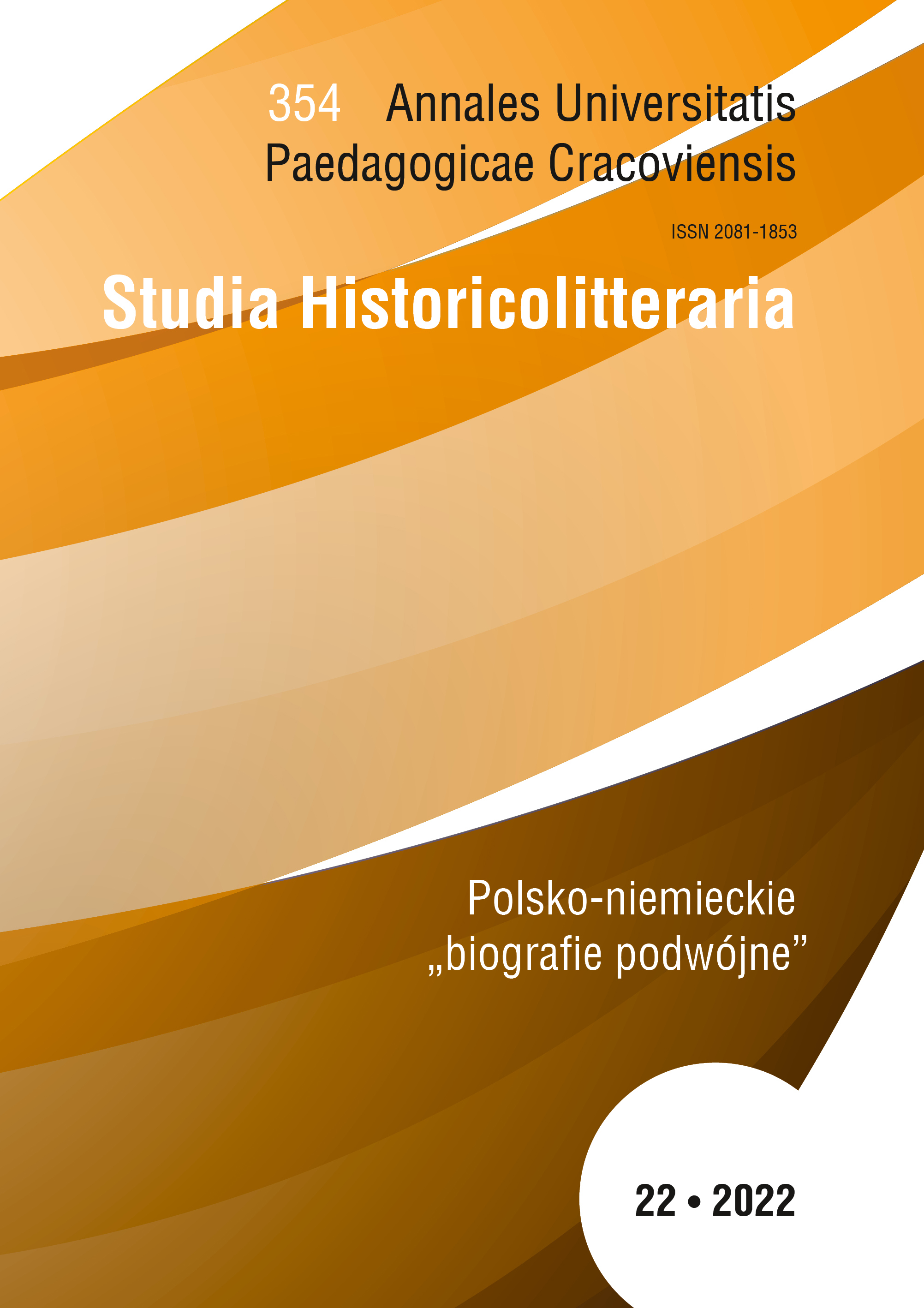Kosmopolska (“Cosmopoland”) by Artur Becker – an open space, a space for exploring one’s own identity
Main Article Content
Abstract
As a Polish writer of German-language works, Artur Becker sees his work and his biography in his self-narrative at the interface of the German language he chose and the Polish culture and language he abandoned due to his emigration to Germany. His novels address the crisis of identity and the search for identity of his characters in exile or on their return to their homeland of Warmia and Masuria. Becker’s collection of essays, published in Polish under the title Kosmopolska i Kosmopolacy. W poszukiwaniu europejskiego domu. Eseje (2019), is also a discourse on the search for identity. The article is an attempt to characterise the Becker’s definition of the term Kosmopolska, which incidentally comes from another émigré writer,
A. Bobkowski. Kosmopolska turns out to be an open space, constructed narratively, that is a space of searching for and creating one’s identity in narrative and through language. This form of defining identity is part of P. Ricoeur’s and Ch. Taylor’s concepts of narrative identity. At each stations of the journey through Kosmopolska, Becker explains the many cultural
patterns and codes rooted in Polish identity, but also shares his advice, literary experts, and thus becomes a mediator between cultures.
Downloads
Article Details

This work is licensed under a Creative Commons Attribution-NonCommercial-NoDerivatives 4.0 International License.
COPYRIGHT POLICY
The publisher of "Annales Universitatis Paedagogicae Cracoviensis.Studia Historicolitteraria" is authorised to use and distribute all the materials published in the journal on the basis of a non-exclusive licence agreement unlimited in time – previously concluded for an indefinite period of time each time with the author of a specific paper in the fields of exploitation specified in the agreement.
OPEN ACCESS POLICY
"Annales Universitatis Paedagogicae Cracoviensis.Studia Historicolitteraria” is an open access journal, and all its contents are available for free to users and/or their institutions on the basis of non-exclusive licenses under Creative Commons (CC BY CC-BY-4.0). Users can read, download, make copies, distribute, print, search, or to link to full text articles in this journal without the prior permission of the publisher or the author.This is consistent with the definition of open access BOAI (http://www.soros.org/openaccess).
References
Artur Becker im Gespräch mit Robert Jończyk, Ich lebe auf einer Insel, [w:] Deutschland und Polenbilder in der Literatur nach 1989, red. C. Gansel, M. Wolting, Göttingen 2015.
Becker A., Kosmopolska i Kosmopolacy. W poszukiwaniu europejskiego domu. Eseje, przeł. J. Dąbrowski oraz D. Muszer, E. Stasik, M. Zybura, Kraków 2019.
Becker A., Von der Kraft der Widersprüche, Dresden 2020.
Benedickt R., Wzory kultury, przeł. Z. Kierszys, J. Prokopiuk, Warszawa 1999.
Bhabha H., Miejsca kultury, przeł. T. Dobrogoszcz, Kraków 2010.
Gadamer H.G., Człowiek i język, [w:] tegoż, Rozum, słowo, dzieje. Szkice wybrane, przeł. K. Michalski, Warszawa 1979, s. 58-69.
Grzegorczykowa R., Problem języka i funkcji tekstu w świetle teorii aktów mowy, [w:] Język a kultura, red. J. Bartmiński, R. Grzegorczykowa, t. 4, Wrocław 1991, s. 11-27.
Lehnert Ch., Einführung zur Chamisso-Dozentur mit Artur Becker, [w:] A. Becker, Von der Kraft der Widersprüche, Dresden 2020, s. 13-25.
Piontek S., Zwischen B und B, „Aussiger Beiträge“ 2012, vol. 6, s. 133-142.
Schmitz W., Von und über Arthur Becker, [w:] A. Becker, Von der Kraft der Widersprüche. Dresden 2020, s. 187-285.
Sobecki M., Wielowymiarowe poczucie tożsamości społeczno-kulturowej. Idea i badanie, perspektywa pedagogiczna, „Kultura i Edukacja” 2018, nr 3 (121), s. 85-103.
Taylor Ch., Źródła podmiotowości: narodziny tożsamości nowoczesnej, przeł. M. Gruszczyński et al., Warszawa 1989.
Urbaniak M., „Tożsamość narracyjna” Ricoeura jako medium między pojęciem i doświadczeniem „ja”, „Rocznik Kognitywistyczny” 2010, t. 4, s. 215-221.
Wolting M., Kim jest, może i powinien być Europejczyk? Kosmopolakiem?, „Transfer. Reception Studies” 2019, t. IV, s. 263-272.
Wójcik P., Translation Identity - Narrative Identitätskonstruktionen in der deutschsprachigen Literatur aus Polen, [w:] Deutschland- und Polenbilder in der Literatur nach 1989, red. C. Gansel, M. Wolting, V&R unipress, 2015.
Zybura M., Wstęp, [w:] A. Becker, Kosmopolska i Kosmopolacy. W poszukiwaniu europejskiego domu. Eseje, przeł. J. Dąbrowski oraz D. Muszer, E. Stasik, M. Zybura, Kraków 2019, s. 15-19.
Źródła internetowe
„O przekraczaniu granic” odczyt i rozmowa z Aliną Kuzborską w Bibliotece Miejskiej w Olsztynie, 22.10.2021,
https://www.olsztyn24.com/news/37726-z-arturem-beckerem-o-przekraczaniu-granic.html (dostęp: 20.04.2022).
„Ryzyko spojrzenia wstecz”, rozmowa z Małgorzatą Bartulą w ramach Unrast Berlin deutsch-polnisches Literaturforum, 17.11.2021, https://unrast-berlin.de/program/ 2100-ryzyko-spojrzenia-wstecz/, (dostęp: 20.04.2022).
